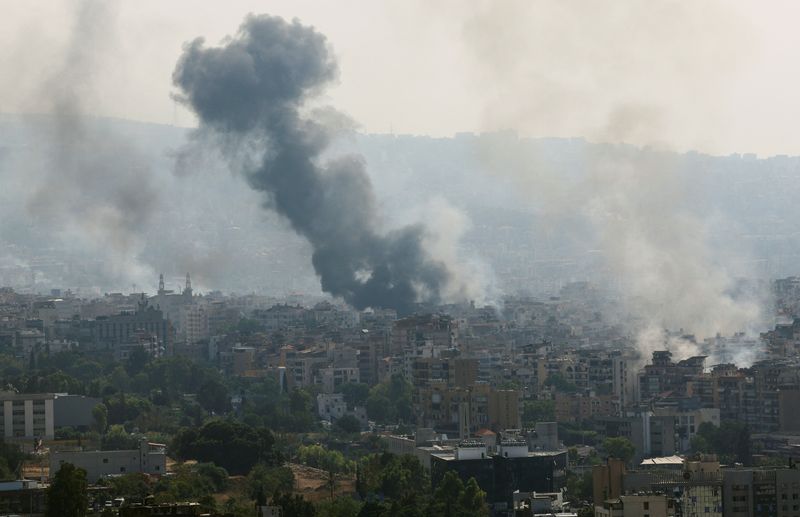By Maayan Lubell and Maya Gebeily
JERUSALEM/BEIRUT (Reuters) -Israel killed Hezbollah leader Sayyed Hassan Nasrallah in a powerful airstrike in Beirut, dealing a huge blow to the Iran-backed group as it reels from an escalating campaign of Israeli attacks.
The Israeli military said on Saturday it had eliminated Nasrallah in the strike on the group’s central command headquarters in Beirut’s southern suburbs a day earlier. Hezbollah confirmed he had been killed, without saying how.
His death is not only a major blow to Hezbollah, but also to Iran, removing an influential ally who helped build Hezbollah into the linchpin of Tehran’s constellation of allied groups in the Arab world.
A senior member of Iran’s Revolutionary Guards, deputy commander Abbas Nilforoushan, was also killed in Israeli attacks in Beirut, Iranian media reported on Saturday.
Hezbollah said in a statement that it would continue its battle against Israel “in support of Gaza and Palestine, and in defence of Lebanon and its steadfast and honourable people”.
Hezbollah’s Al-Manar TV aired Koran verses after his death was announced. Bursts of gunfire were heard in Beirut.
Friday’s airstrike – a succession of massively powerful blasts that left a crater at least 20 metres (65 feet) deep – shook Beirut. Israel carried out further airstrikes on the area and more widely in Lebanon on Saturday.
The Israeli military said earlier that Nasrallah was eliminated in a “targeted strike” on the group’s underground headquarters beneath a residential building in Dahiyeh – a Hezbollah-controlled southern suburb of Beirut.
It said he was killed along with another top Hezbollah leader, Ali Karaki, and other commanders.
“The strike was conducted while Hezbollah’s senior chain of command were operating from the headquarters and advancing terrorist activities against the citizens of the State of Israel,” it said.
Nasrallah’s death is by far the most significant blow in a devastating fortnight for Hezbollah, starting with a deadly attack on thousands of wireless communications devices used by its members. Israel also significantly ramped up airstrikes in Lebanon, killing several top Hezbollah commanders and hundreds of other people across wide areas of the country.
SUCCESSION
Hezbollah gave no immediate indication of who might succeed Nasrallah. Senior Hezbollah official Sayyed Hashem Safieddine has long been regarded as heir apparent. The group has not issued any statement on Safieddine’s status or that of any other Hezbollah leaders – apart from Nasrallah – since the attack.
Friday’s attacks on Dahiyeh were followed by more strikes on the area and other areas of Lebanon on Saturday. Huge explosions lit up the night sky, and more strikes hit the area in the morning. Smoke rose over the city.
Hezbollah continued its cross-border rocket fire on Saturday, setting off sirens and sending residents running for shelter deep inside Israel. Israeli missile defences blocked some of them and there was no immediate report of injuries.
The escalation has increased fears the conflict could spin out of control, potentially drawing in Iran, Hezbollah’s principal backer, as well as the United States.
Israeli Defence Minister Yoav Gallant said Israel’s war was not with the Lebanese people, calling Nasrallah the “murderer of thousands of Israelis and foreign citizens”.
“To the people of Lebanon, I say: Our war is not with you. It’s time for change,” he said.
Hezbollah has been waging hostilities with Israel since the eruption of the Gaza war a year ago, when it opened fire declaring solidarity with its Palestinian ally Hamas.
Hezbollah has said it would only cease fire when Israel’s Gaza offensive ends.
Hamas and other allies of Hezbollah issued statements mourning his death.
LEBANON ASKS IRANIAN PLANE NOT TO LAND
Residents have fled Dahiyeh, seeking shelter in downtown Beirut and other parts of the city.
“Yesterday’s strikes were unbelievable. We had fled before and then went back to our homes, but then the bombing got more and more intense, so we came here, waiting for Netanyahu to stop the bombing,” said Dalal Daher, speaking near Beirut’s Martyrs Square, referring to Israeli Prime Minister Benjamin Netanyahu.
Israel says it has been attacking Hezbollah with the aim of allowing tens of thousands of residents evacuated from northern Israel to return home. In Lebanon, well over 200,000 people have been displaced, around half of them since Monday.
Lebanon’s transport and public works ministry asked an Iranian plane not to enter Lebanese airspace after Israel warned on Friday air traffic control at the Beirut airport that it would use “force” if it landed, a source at the Lebanese transport ministry told Reuters. The source said it was not clear what was on the plane, adding: “The priority is people”.
Late on Friday, Israeli military spokesperson Rear Admiral Daniel Hagari said Israeli air force planes were “patrolling the area of the Beirut airport” and would not allow “hostile flights with weapons to land” there.
“We know about Iranian arms transfers to Hezbollah and are thwarting them,” he said.
Iran Air has cancelled all flights to Beirut until further notice, the airline’s spokesman told local media on Saturday.

Hezbollah has fired hundreds of rockets and missiles at targets in Israel, including Tel Aviv.
The Israeli military said the country is on high alert for a broader conflict. “It’s safe to assume that they are going to continue carrying out their attacks against us or try to,” Lieutenant Colonel Nadav Shoshani said in a media briefing.